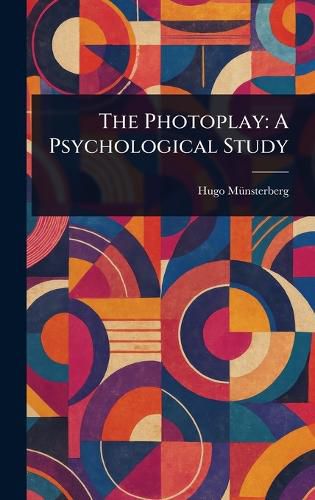Readings Newsletter
Become a Readings Member to make your shopping experience even easier.
Sign in or sign up for free!
You’re not far away from qualifying for FREE standard shipping within Australia
You’ve qualified for FREE standard shipping within Australia
The cart is loading…






This title is printed to order. This book may have been self-published. If so, we cannot guarantee the quality of the content. In the main most books will have gone through the editing process however some may not. We therefore suggest that you be aware of this before ordering this book. If in doubt check either the author or publisher’s details as we are unable to accept any returns unless they are faulty. Please contact us if you have any questions.
"The Photoplay: A Psychological Study" by Hugo Muensterberg delves into the fascinating intersection of motion pictures and the human mind. This landmark work explores the psychology of film, examining how visual perception and the unique aesthetics of the "photoplay" influence our experience.
Muensterberg, a pioneer in the field, analyzes the power of film techniques to shape our emotions and understanding. From editing and close-ups to flashbacks and point-of-view shots, he reveals how these elements manipulate our attention and create a compelling narrative.
A crucial text for understanding the development of film theory and media studies, this book remains relevant for anyone interested in the history and criticism of film, the psychology of art, and the social impact of motion pictures. This edition allows a new generation to rediscover Muensterberg's insights into the enduring power of the cinematic image.
This work has been selected by scholars as being culturally important, and is part of the knowledge base of civilization as we know it.
This work is in the public domain in the United States of America, and possibly other nations. Within the United States, you may freely copy and distribute this work, as no entity (individual or corporate) has a copyright on the body of the work.
Scholars believe, and we concur, that this work is important enough to be preserved, reproduced, and made generally available to the public. We appreciate your support of the preservation process, and thank you for being an important part of keeping this knowledge alive and relevant.
$9.00 standard shipping within Australia
FREE standard shipping within Australia for orders over $100.00
Express & International shipping calculated at checkout
This title is printed to order. This book may have been self-published. If so, we cannot guarantee the quality of the content. In the main most books will have gone through the editing process however some may not. We therefore suggest that you be aware of this before ordering this book. If in doubt check either the author or publisher’s details as we are unable to accept any returns unless they are faulty. Please contact us if you have any questions.
"The Photoplay: A Psychological Study" by Hugo Muensterberg delves into the fascinating intersection of motion pictures and the human mind. This landmark work explores the psychology of film, examining how visual perception and the unique aesthetics of the "photoplay" influence our experience.
Muensterberg, a pioneer in the field, analyzes the power of film techniques to shape our emotions and understanding. From editing and close-ups to flashbacks and point-of-view shots, he reveals how these elements manipulate our attention and create a compelling narrative.
A crucial text for understanding the development of film theory and media studies, this book remains relevant for anyone interested in the history and criticism of film, the psychology of art, and the social impact of motion pictures. This edition allows a new generation to rediscover Muensterberg's insights into the enduring power of the cinematic image.
This work has been selected by scholars as being culturally important, and is part of the knowledge base of civilization as we know it.
This work is in the public domain in the United States of America, and possibly other nations. Within the United States, you may freely copy and distribute this work, as no entity (individual or corporate) has a copyright on the body of the work.
Scholars believe, and we concur, that this work is important enough to be preserved, reproduced, and made generally available to the public. We appreciate your support of the preservation process, and thank you for being an important part of keeping this knowledge alive and relevant.